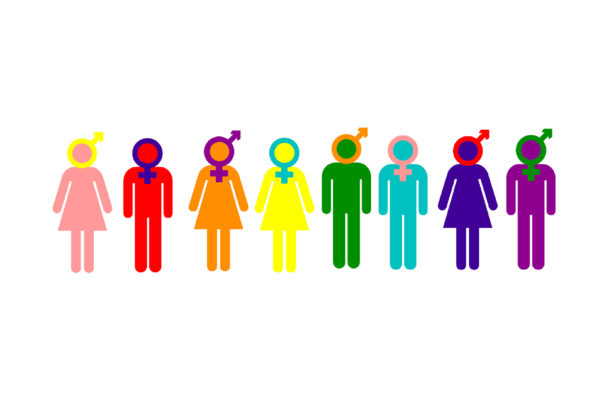By Stella Cooper
Gaydar activated, I am more than spoilt for choice when it comes to queer clubbing and socialising in Brighton. I’m sure many of you feel other cities seem grey, mundane and, most strikingly, straight in comparison.
As Europe’s gay capital, you would think that it’s impossible for Brighton to be unfriendly.However, this paradox has shown itself to me on numerous occasions. As a queer female identifying person, I feel I must share what has led to humiliation and disappointment in the community.
If you belong to the LGBTQ+ community, you may be fully aware of the sub-labels within the labels; it’s no longer specific enough to be Lesbian, or Bi for example. The commonality in such a vast community is to fall under ‘butch’ or ‘femme’. Oh no! My bad, are you actually a ‘soft femme’ or a ‘stone butch’ ?
If not, it must mean you’re some kind of ‘baby dyke’ or another stereotype. I often ignore these labels due to their rigidity. What happens if I’m just me-just Stella?
Believe it or not, some womxn (a term we use to include trans women) don’t want the buzzcut, or the undercut, or even the nose ring. Shock horror, we all have our own unique styles that needn’t be decided by sexuality. Often, I’ve contemplated having my hair short again, but why should I feel this will make me ‘more gay’?
I don’t want to call out anyone who feels associated to any of the labels or appearances mentioned, since they can be entirely helpful to express identity within the community for many womxn.
I have met and dated womxn who are very comfortable associating themselves with stereotypes. However, I am getting bored of being thrown into boxes. If the physical criteria is not met, I automatically don’t fit in.
Yet, surely, being an ‘outsider’ is what Brighton embraces. On Valentine’s evening, feeling liberated and lax, a group of friends and I headed to a specifically LGBTQ+ event which had a majority of lesbian attendees. It was a great example of the diversity of events on offer in the city to advocate that ‘love is love.’
Having absorbed the tensely curious atmosphere, I needed a break from the dance floor.When trying to get out of the crowd, there was a large force on my back, and the next moment I was falling towards the floor.
Picking myself back up again, I turned around to a laughing group of tom-boyish girls all wearing caps, sniggering at me. I was loudly told that I’d knocked one of their ‘femme’ friends. Apparently this justified their aggression.
Just to reiterate, I had come here to relax and feel like I was in a welcoming environment. The result couldn’t have been more ironic.
Sadly, this experience in an LGBTQ+ space is not new. Queer female identifying friends of mine speak of how in Brighton, they are called ‘straight’ every time they enter a gay club or event.
The last thing to expect in any gay club is to be physically or verbally assaulted. Perhaps it’s a far stretch to call this discrimination, but it’s frustrating that as one of the most liberal cities in the world, Brighton has a filter of who ‘looks queer’. When I get a comment such as, “you look gay/straight”, I am led to wonder what has come about to inform that decision.
Often when gay clubs get accused of being too straight, the judgement isn’t being assessed by who is LGBTQ+, but who looks LGBTQ+.
I feel, in particular, that lesbian labels can indirectly objectify womxn to being ‘out’ or ‘straight.’ It’s as though some of us are not allowed to be queer in the very spaces we want to experiment in freely.
Where up to 15% of Brighton’s population are LGBTQ+ (which is over four times the number in Greater London), it has added a certain promiscuous image to everyone in the community. Polyamory is the norm. A passing comment made about me, from a lesbian to an ex-girlfriend, emphasised this: “She’s a queer, first year student! Isn’t that a massive red flag for you?”
The logic of these comments is hard to fathom in the community. I simply don’t fall into the right camp for most lesbians. Age, sexuality and image are all potentials for criticism between LGBTQ+ womxn.
I’m more comfortable at less specific gay clubbing events, where there’s a balance of LGBTQ+ and straight people. It’s more likely in these situations to be asked for your preference, rather than it be decided for you. Shockingly the more lesbian the event is, the more marginalised I feel when I’m just trying to socialise with other womxn.
I want to call on the lesbian community in particular; break your cliques and classifications. Whether the city is conscious or not of existing hostility, the name and shame culture of labels degrades womxn and contributes to a heteronormative culture.
No one should have to feel aligned to a ‘masc’ or ‘femme’ image if it’s not their preference. Non-binary identification is excluded from this narrative, when it should be embraced. Brighton has an expanding plethora of opportunities for queer womxn, don’t let the labels bring you down.
Image Credit: Admin, The Docket

